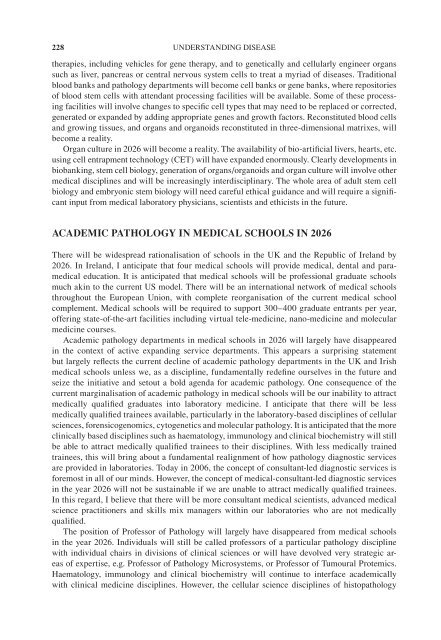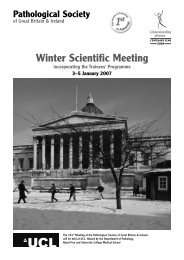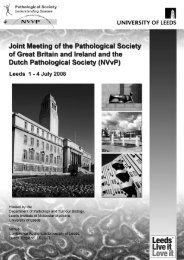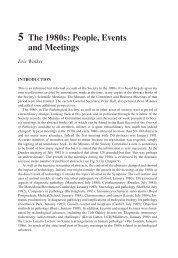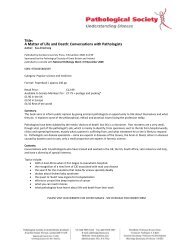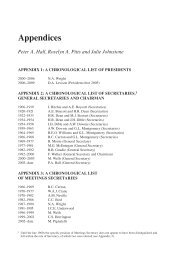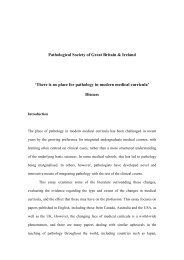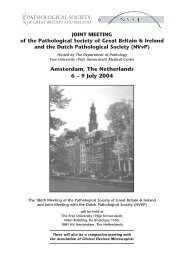The Future of Laboratory Medicine and Academic Pathology
The Future of Laboratory Medicine and Academic Pathology
The Future of Laboratory Medicine and Academic Pathology
You also want an ePaper? Increase the reach of your titles
YUMPU automatically turns print PDFs into web optimized ePapers that Google loves.
228 UNDERSTANDING DISEASE<br />
therapies, including vehicles for gene therapy, <strong>and</strong> to genetically <strong>and</strong> cellularly engineer organs<br />
such as liver, pancreas or central nervous system cells to treat a myriad <strong>of</strong> diseases. Traditional<br />
blood banks <strong>and</strong> pathology departments will become cell banks or gene banks, where repositories<br />
<strong>of</strong> blood stem cells with attendant processing facilities will be available. Some <strong>of</strong> these processing<br />
facilities will involve changes to specifi c cell types that may need to be replaced or corrected,<br />
generated or exp<strong>and</strong>ed by adding appropriate genes <strong>and</strong> growth factors. Reconstituted blood cells<br />
<strong>and</strong> growing tissues, <strong>and</strong> organs <strong>and</strong> organoids reconstituted in three-dimensional matrixes, will<br />
become a reality.<br />
Organ culture in 2026 will become a reality. <strong>The</strong> availability <strong>of</strong> bio-artifi cial livers, hearts, etc.<br />
using cell entrapment technology (CET) will have exp<strong>and</strong>ed enormously. Clearly developments in<br />
biobanking, stem cell biology, generation <strong>of</strong> organs/organoids <strong>and</strong> organ culture will involve other<br />
medical disciplines <strong>and</strong> will be increasingly interdisciplinary. <strong>The</strong> whole area <strong>of</strong> adult stem cell<br />
biology <strong>and</strong> embryonic stem biology will need careful ethical guidance <strong>and</strong> will require a signifi -<br />
cant input from medical laboratory physicians, scientists <strong>and</strong> ethicists in the future.<br />
ACADEMIC PATHOLOGY IN MEDICAL SCHOOLS IN 2026<br />
<strong>The</strong>re will be widespread rationalisation <strong>of</strong> schools in the UK <strong>and</strong> the Republic <strong>of</strong> Irel<strong>and</strong> by<br />
2026. In Irel<strong>and</strong>, I anticipate that four medical schools will provide medical, dental <strong>and</strong> paramedical<br />
education. It is anticipated that medical schools will be pr<strong>of</strong>essional graduate schools<br />
much akin to the current US model. <strong>The</strong>re will be an international network <strong>of</strong> medical schools<br />
throughout the European Union, with complete reorganisation <strong>of</strong> the current medical school<br />
complement. Medical schools will be required to support 300–400 graduate entrants per year,<br />
<strong>of</strong>fering state-<strong>of</strong>-the-art facilities including virtual tele-medicine, nano-medicine <strong>and</strong> molecular<br />
medicine courses.<br />
<strong>Academic</strong> pathology departments in medical schools in 2026 will largely have disappeared<br />
in the context <strong>of</strong> active exp<strong>and</strong>ing service departments. This appears a surprising statement<br />
but largely refl ects the current decline <strong>of</strong> academic pathology departments in the UK <strong>and</strong> Irish<br />
medical schools unless we, as a discipline, fundamentally redefi ne ourselves in the future <strong>and</strong><br />
seize the initiative <strong>and</strong> setout a bold agenda for academic pathology. One consequence <strong>of</strong> the<br />
current marginalisation <strong>of</strong> academic pathology in medical schools will be our inability to attract<br />
medically qualifi ed graduates into laboratory medicine. I anticipate that there will be less<br />
medically qualifi ed trainees available, particularly in the laboratory-based disciplines <strong>of</strong> cellular<br />
sciences, forensicogenomics, cytogenetics <strong>and</strong> molecular pathology. It is anticipated that the more<br />
clinically based disciplines such as haematology, immunology <strong>and</strong> clinical biochemistry will still<br />
be able to attract medically qualifi ed trainees to their disciplines. With less medically trained<br />
trainees, this will bring about a fundamental realignment <strong>of</strong> how pathology diagnostic services<br />
are provided in laboratories. Today in 2006, the concept <strong>of</strong> consultant-led diagnostic services is<br />
foremost in all <strong>of</strong> our minds. However, the concept <strong>of</strong> medical-consultant-led diagnostic services<br />
in the year 2026 will not be sustainable if we are unable to attract medically qualifi ed trainees.<br />
In this regard, I believe that there will be more consultant medical scientists, advanced medical<br />
science practitioners <strong>and</strong> skills mix managers within our laboratories who are not medically<br />
qualifi ed.<br />
<strong>The</strong> position <strong>of</strong> Pr<strong>of</strong>essor <strong>of</strong> <strong>Pathology</strong> will largely have disappeared from medical schools<br />
in the year 2026. Individuals will still be called pr<strong>of</strong>essors <strong>of</strong> a particular pathology discipline<br />
with individual chairs in divisions <strong>of</strong> clinical sciences or will have devolved very strategic areas<br />
<strong>of</strong> expertise, e.g. Pr<strong>of</strong>essor <strong>of</strong> <strong>Pathology</strong> Microsystems, or Pr<strong>of</strong>essor <strong>of</strong> Tumoural Protemics.<br />
Haematology, immunology <strong>and</strong> clinical biochemistry will continue to interface academically<br />
with clinical medicine disciplines. However, the cellular science disciplines <strong>of</strong> histopathology


